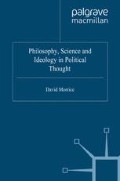Abstract
The solution of the problem of ideology is rational political philosophy, which can avoid the problem of relativism by giving an objective justification of political values and making an objective distinction between proper and improper values. The nature of rational political philosophy, or moral political science, as it might also properly be termed, is the concern of this final chapter. Rational political philosophy, as a normative discipline, is the study of objective moral and political reality. Chapter 5 considered Roy Bhaskar’s scientific realism, which holds that there is a scientific reality which is both independent of and accessible to human thought. This stress on objective reality is to be welcomed as an antidote to the relativism of both the post-positivist natural science of Popper, Lakatos, Kuhn and Feyerabend, and the interpretivist social science of Winch and Taylor. However, Bhaskar’s normative thought is not adequate. I now propose to argue for a more adequate moral and political realism, as the only antidote to the problem of moral relativism, which is the problem of political ideology.
Access this chapter
Tax calculation will be finalised at checkout
Purchases are for personal use only
Preview
Unable to display preview. Download preview PDF.
Notes
C.B. Macpherson, ‘Hobbes’s Bourgeois Man’, in K Brown (ed.), Hobbes Studies (Oxford, Blackwell, 1965), pp. 170 and 180.
L. Doyal and I. Gough, A Theory of Human Need (London, Macmillan, 1991), chapter 2.
C.B. Macpherson, The Rise and Fall of Economic Justice (Oxford, Oxford University Press, 1985), pp. 55–6.
C.B. Macpherson, Democratic Theory: Essays in Retrieval (Oxford, Clarendon Press, 1973), p. 198.
C.B. Macpherson, ‘Needs and Wants: An Ontological or Historical Problem?’, in. R. Fitzgerald (ed.), Human Needs and Politics (Rushcutters Bay, NSW, Pergamon, 1977), p. 34 (Macpherson’s emphasis).
G. Grisez, ‘The Structures of Practical Reason’, The Thomist, 1988, vol. 52, pp. 278–9.
R. Mclnerny, ‘Ethics’, in N. Kretzman and E. Stump (eds), The Cambridge Companion to Aquinas (Cambridge, Cambridge University Press, 1993), p. 211.
R. Mclnerny, Ethica Thomistica (Washington, DC, The Catholic University of America Press, 1982), p. 46.
H. Veatch, ‘Natural Law and the “Is”—“Ought” Question’, The Catholic Lawyer 1981, vol. 26, pp. 251 and 258.
V. Bourke, ‘Natural Law, Thomism—And Professor Nielsen’, Natural Law Forum, vol. 5, 1960, p. 118.
R. Hittinger, ‘Varieties of Minimalist Natural law Theory’, American Journal of Jurisprudence, 1989, vol. 34, p. 159.
R. Beiner, Political Judgement (London, Methuen, 1983), p. 2.
Author information
Authors and Affiliations
Copyright information
© 1996 David Morrice
About this chapter
Cite this chapter
Morrice, D. (1996). Rational Political Philosophy. In: Philosophy, Science and Ideology in Political Thought. Palgrave Macmillan, London. https://doi.org/10.1057/9780230378223_10
Download citation
DOI: https://doi.org/10.1057/9780230378223_10
Publisher Name: Palgrave Macmillan, London
Print ISBN: 978-1-349-39925-3
Online ISBN: 978-0-230-37822-3
eBook Packages: Palgrave Political & Intern. Studies CollectionPolitical Science and International Studies (R0)

